- Home
- Steve Hockensmith
S Hockensmith - H03 - The Black Dove Page 7
S Hockensmith - H03 - The Black Dove Read online
Page 7
Not alive, anyway.
Beyond the pass-through was a box-packed storage room and, to the right, a narrow, steep stairwell leading to the second floor.
“Come on up . . . if you really want,” Sarge said, leaning out around the corner at the top of the stairs. “I’m warning you, though. It stinks even worse up here.”
Then he was gone.
Of course, this warning didn’t slow Diana and Gustav. And it didn’t slow me, either. It was the stench that did that.
With each step I took up the stairs, the putrid aroma grew more potent. It was one of those scents you can taste as much as smell . . . which was mighty unfortunate, since it smelled like a bucketful of buttermilk and hard-boiled eggs left out all day under an August sun.
“What is that, anyway?” I coughed out.
“Ain’t quite right for a bloated-up body,” Gustav said. “But it’s close.”
“It’s gas from the pipes, actually,” Diana said without looking back at us. “It has no smell in its natural state, so the gas company adds chemicals to give it an easily detectable odor.”
“Oh, that’s easy to detect, alright.” I swiped off my straw hat and gave it a wave under my nose. “Any easier and I’d pass out.”
My brother’s only response was a vexed grunt—and I figured I knew why. The buildings he knows best are lit with oil lamps, candles, or the simple glow of a fire, not gas. If Diana hadn’t been there to set us straight, he might have “deduced” that somebody upstairs had been breeding skunks. The stink of that gas was just the kind of thing I’d been riding him about the day before: a city clue . . . the kind he couldn’t catch.
Old Red stomped to the top of the stairs with such booming clops I almost feared he’d splinter the steps.
Up on the second floor was a small, dimly lit flat through which the noxious vapors swirled so heavy I could practically feel them flowing around me like water. That wasn’t what stopped me dead in my tracks, though. The bed in the corner did that. Or the man stretched out atop it, anyway.
It was Dr. Chan, alright—though not the same Dr. Chan we’d talked to just the day before. His clothes, normally so neat and sleek, were rumpled, and his round-rimmed spectacles were gone. He was lying on his back, eyes half-lidded, mouth half-open. All dead. And all grayish-blue, too, to judge by the darkened tinge to his hands and face.
I’d seen skin that color before—when I’d buried the last of my family, aside from Gustav. Like my kin back in Kansas, Chan had died for the simplest reason there is: He couldn’t breathe anymore. The only difference being their lungs had filled with floodwater and his had filled with gas.
I grabbed a sheet bunched up at the foot of the bed and pulled it over the body.
“There’s a lady present, case you hadn’t noticed.”
“Sorry,” Sarge said with all the sincerity of a cat apologizing to the mouse it was about to stuff in its mouth. “I hope the ladys not upset.”
I turned and got my first good look at the man in his entirety. He was stocky, thick-necked, and clad not in a bull’s blue frock but a businessman’s brown tweed.
And he wasn’t alone. Behind him was a tubby Chinaman sporting such a jutting gut he could make even a bulky fellow like myself feel like Jack Sprat. A neatly trimmed mustache and chin whiskers adorned his jowly face, and he dressed himself American fashion, though not in the starchy formal attire Chan had favored. Instead, he was wearing a white seersucker suit with matching hat. If not for the man’s Oriental features, he could’ve passed for a Southern gentlemen on his way to the veranda for a sip of mint julep.
“You needn’t worry about me,” Diana said to Sarge, her voice hushed but remarkably calm. “I probably saw more dead men before I was four than you’ve seen in your entire life, Sergeant . . . ?”
Sarge gave the lady a smirky half-smile, unimpressed by her bravado.
“Mahoney,” he said. “Cathal Mahoney.”
“Ahhhhh.” Diana nodded. “ ‘The Coolietown Crusader’ himself.”
Mahoney waved off the nickname with a swipe of his paw—though I could see he was pleased the lady knew it.
“Oh, that’s just newspaper bunk. I’m only doing my job.”
“Which is?” I asked.
“Sergeant Mahoney recently took over the police department’s Chinatown Squad,” Diana explained. “He’s become a great favorite of the Morning Call.”
“Oh,” I said. “I see.”
The Call was one of the local papers Old Red and I didn’t bother with, as it tended to run stuff that made the sandwich man’s rants against the Chinese sound like the Sermon on the Mount. If Cathal Mahoney was a favorite of theirs, he’d likely be no favorite of ours.
I peeked over at the big Chinaman, wondering what his take on all this might be. But it was hard to tell if he was even awake to have one. His heavy-lidded eyes were closed to mere slits, and his face was utterly blank.
Diana turned toward him, too.
“And this is . . . ?”
Mahoney answered before the Chinaman could.
“Wong Woon. He’s a sort of dick for hire. Like you, I guess.”
Woon woke up enough to bow his head ever so slightly.
“A colleague, hmmm?” Diana said, her eyes still on the Chinaman. “Working for whom?”
“Excuse me,” Mahoney cut in, “but I still don’t know who you are, exactly.”
“Oh, for god’s sake, haven’t we had enough how-do’s?” Gustav shook a pointed a finger at the bed. “There’s a dead feller under that sheet, and we’re standin’ around gabbin’ like we was at an ice-cream social!”
“The Coolietown Crusader” gave my brother a glare that said his next crusade might be against loud-mouthed cowboys—and it could start any second.
“I apologize if we seem a tad overanxious, Sergeant,” Diana said soothingly. “But you must understand—we’d become rather fond of Dr. Chan. You see, he recently met with some misfortune while traveling on a Southern Pacific special, and we’ve been in communication with him about the appropriate level of compensation. Finding out Chan’s dead . . . well, it’s quite a shock. As for who we are . . .”
The lady gestured to each of us in turn, introducing us as “Gustav Amlingmeyer, Otto Amlingmeyer, and Diana Corvus of the Southern Pacific Railroad.”
Which had at least some truth to it. Old Red and I were definitely of the S.P.’s past. As for Diana . . . I didn’t know what the truth was.
“Alright,” my brother grumbled, “now that we’re all acquainted-like, why doesn’t somebody tell me what the heck supposedly happened here.”
“There’s no ‘supposedly’ to it, Tex,” Mahoney scoffed. “Chan killed himself.”
“Well, why don’t you lay it all out for us, Frisco,” Old Red said, “and then we’ll just see what supposin’ needs to be done.”
“Please,” Diana threw in—and good thing, too, since Mahoney looked like he was thinking of throwing us out.
“Fine,” Mahoney growled. “Here’s the story. One of Chan’s neighbors was passing by this morning and smelled gas. He came inside to investigate, but Chan was nowhere in sight. So he came up here and found Chan laid out like that, with the gas line for the lights opened up. Everyone in Chinatown knows Chan had money troubles. Obviously, the man gassed himself.” He shrugged. “To them, it’s the honorable thing to do.”
Gustav listened intently to Mahoney’s report—while not sparing the man so much as a glance as he made it. In fact, my brother’s eyes were on everything but Mahoney.
He was making a methodical study of Chan’s digs, inspecting everything from the floorboards to the ceiling and back again.
The flat was narrow and gloomy—it could’ve been a sharecropper’s shotgun shack but for the smudged-up light fixtures jutting from the walls here and there. The only other adornments to the place were a birdcage hanging from a brass stand in one corner and what looked like a gaudily decorated shelf, almost like a miniature theater stage, on the floor
in another. Lining the walls were pasteboard boxes and small crates in tidy rows.
At the far end of the room was a door, ajar. It led to what appeared to be a dingy kitchenette. It, too, was chock-a-block with neatly stacked boxes. Over the grime-grayed sink, ragged yellow “curtains”—they looked more like old dishrags—swayed slightly in the listless breeze that blew in through an open window.
When Mahoney was done, Old Red drifted over to the birdcage and peeked inside. Then he moved on to the little stagelike affair on the floor in the opposite corner. It was painted light red, with large Chinese letters running down the back in gold. Resting atop it were bundles of paper that looked like play money, a plate with an orange on it, and a cup filled with dark, thin twig-looking things.
“So you think it’s obvious, huh?” Gustav squatted and picked up one of the brownish-black sticks. “Well, let me tell you something, Sarge . . .” And he launched into a line from “The Boscombe Valley Mystery”: “ ‘There is nothing more deceptive than an obvious fact.’ ”
Mahoney wrinkled his nose as if my brother’s words had just doubled the room’s already impressive stench. “That’s the dumbest thing I ever heard.”
Old Red gave the little stick in his fingers a whiff, too distracted to take offense.
“You’ve found a clue,” Diana said, sounding both excited and strangely amused.
“I don’t know if you could go so far as to call it that. But it shoots any notion of suicide clean out of the saddle as far as I’m concerned.” My brother held up the stick and looked over his shoulder at Woon. “What are these things, anyhow?”
“Joss sticks. Incense. That’s an altar,” Mahoney said before the Chinaman could so much as part his lips. “Now what are you talking about? Why couldn’t Chan have committed suicide?”
“An altar, huh?” Gustav dropped the “joss stick” back into its cup. “Well, looks like somebody nicked whatever god it is Doc Chan used to pray to.”
“What do you mean?” Diana asked.
“Well, it’s plain enough this thing used to sit in the sunshine—you can see by the way the paint’s faded here and there.” Old Red pointed at a spot in the center of the altar. “But not there.”
The rest of us leaned in closer, like puppets pulled by the same invisible strings.
My brother was right. There was an oval-ish spot where the paint was noticeably darker—rich red as opposed to sun-bleached pink.
Mahoney straightened up first.
“That’s your proof Chan didn’t kill himself?”
“Nope. That’s just extry data.” Gustav rose up and walked to Chan’s bed—and body. “Ain’t the real nub of it at all.”
Then he stopped and stood silently before the bed like a mourner paying his last respects.
“Yeah?” Mahoney prodded him. “And the ‘nub’ is . . . ?”
“There’s a dead canary in that birdcage yonder,” Old Red said.
And he reached down, whipped off the sheet, and rolled Chan over.
“Hey!” Mahoney squawked. “Get your paws off that body!”
Gustav ignored him, going down on one knee and brushing his fingers gently over the back of Chan’s head.
“Don’t look like any of you supposed professionals even bothered to . . . hel-lo.”
He tugged at Chan’s pants and took a peep at the dead man’s keister. That, at last, was too much for Mahoney. He charged forward and grabbed Old Red by the collar.
Before he could yank my brother to his feet, though, the cop felt hands on his collar. Mine.
“Don’t” I said. “He knows what he’s doin’.”
Even if I don’t, I chose not to add.
Mahoney let go of Gustav and twisted free of my grip.
“Let me give you yokels some advice,” he snapped, jabbing a finger into my chest like I was a balloon he was trying to pop with a pin. “This isn’t some pissant cow town. It’s San Francisco. And around here, men who lay hands on a cop get their heads busted no matter who they work for.”
“Sergeant, I’m sorry—but just hear Mr. Amlingmeyer out,” Diana pleaded. “There’s method to his madness, I promise you.”
“Ain’t madness at all. Just method,” Old Red said. Despite the jostling he’d received, he was still hunched over Chan’s body, his hands now snaking into the dead man’s pockets. “ ‘Madness’ wouldn’t get you this, now would it?”
He turned around holding up a folded slip of paper. Out of force of habit, perhaps, he handed it to his usual translator: me.
“Gimme that,” Mahoney snarled, snatching the paper from my fingers. He unfolded it with an angry snap of the wrist.
“Oh.” He handed the little note to Woon. “It’s in Chinese.”
The Chinaman appeared utterly unruffled by our little tussle, and he peered down at the paper as coolly as a man looking over a menu.
When he finally spoke, it was in a surprisingly lilting, sing-song voice—though his words sure struck a sour note.
“Suicide note,” he said.
“Bull-shit” said my brother.
9
BODY OF EVIDENCE
Or, Gustav Makes a Few Deductions and a Few New Enemies
“Excuse me?” Mahoney said, hacking out an incredulous laugh.
“You heard me.” Old Red pointed at the slip of paper in Woon’s hand. “If that’s a ‘suicide note,’ I’m the Queen of Sheba.”
“I’ll tell you what you are, you little—”
“Why don’t you read the note for us, Mr. Woon?” Diana said, shifting everyone’s attention to the chubby Chinaman—and away from the brawl that was about to break out. “So we can judge for ourselves.”
Woon peered at her a moment . . . then refolded the note and slid it into one of the voluminous pockets of his seersucker suit.
“No,” Woon said, his heavily accented voice still silky-soft. “Is private message. For certain gentleman only. I see he receive it.”
He looked over at Mahoney, seemingly sending him a private message, as well.
“And that’s good enough for you?” my brother snapped at the cop.
Mahoney’s eyes flicked from Woon’s now-empty hand to his round, placid face. “Chan wrote that? Saying he was gonna kill himself?”
Woon nodded once, the slow down-up of his head pressing then stretching the folds of flesh hanging from his chin like the bellows of a squeezebox.
“Suicide note.”
“Alright, then,” Mahoney said. “That settles it.”
Just from the way my brother drew in his breath, I knew what was coming next: a retort so pointed it’d draw blood. Diana must’ve seen it coming, too.
“Putting aside the note, for the moment,” she said before Gustav could cut the copper to the quick—and get himself beat to a pulp. “My colleague here said he had reason to doubt suicide. Something about . . . a dead canary?”
“That’s right.” Old Red jerked a thumb at the birdcage, his eyes never leaving Mahoney. “The little feller in there.”
“Uh-huh.” Mahoney drew the sounds out slowly, as if he was agreeing with some foamy-mouthed lunatic’s pronouncement that water is wet. “Soooooo . . . what? You think the suicide note was really for the bird?”
“Oh, for Christ’s sake,” Gustav spat. “The canary would’ve died before Chan did—died noisy, too. Why do you think they take ’em down in coal mines? For the tunes?”
Mahoney threw up his hands. “So?”
“So Chan would’ve knowed his pet was dyin’. His last moments on earth, he would’ve been listenin’ to its pitiful little death rattle.” My brother shook his head. “No. Not the Chan I knew. He was a healer. Maybe he’d kill himself, but never would he have killed that little bird. He would’ve set it free first.”
“That’s your proof?”
The cop shot Woon a “Can you believe this shit?” grimace. Whether Woon believed or not, one couldn’t say—he merely stared at my brother through heavy, half-lidded eyes, so expressionless a cig
ar store Indian would’ve looked like Sarah Bernhardt by comparison.
“The man was suicidal,” Mahoney said. “He wasn’t going to stop to worry about his canary.”
“That ain’t enough to get you thinkin’, then how’s about this?” Old Red persisted. “You say some neighbor found Chan’s body after smellin’ gas outside. But we didn’t get a whiff of nothing till we was practically at the foot of the stairs. Well . . . how is it that feller could know it was gettin’ gassy up here?”
Mahoney curled his lips into a sneer. “He’d know because the front door was wide open and gas was blowing right out onto the sidewalk. By the time you three got here, the gas had been off an hour and the downstairs had aired out.”
“Excuse me? A feller goes to gas himself . . . and he leaves the front door open?” Gustav looked like a man trying to teach long division to a chicken. “And that don’t give your brain a little tickle?”
“Look,” Mahoney said, “Chan wasn’t thinking straight. Everyone in Chinatown knew he was broke . . . thanks to your railroad, I might add. He was about to kill himself. You can’t expect everything he did to make sense.”
“Well, that’s an awful convenient way of lookin’ at things, ain’t it?” Old Red said. “Cuz then you don’t have to wonder why Chan would rub gravel on his head and pull his shirttails outta his britches before climbin’ into bed to die.”
Woon finally seemed to wake up, his droopy eyes at last popping fully open.
“You say ‘gravel’?”
My brother nodded. “In Chan’s—”
“Don’t bother,” Mahoney cut in. “Like I said before, I can already explain everything: Chan was nuts. And so are you, Tex.”
“But, Sergeant,” Diana said, “wouldn’t it behoove you to—?”

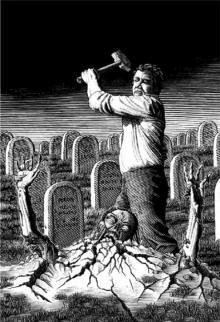 Dawn of the Dreadfuls
Dawn of the Dreadfuls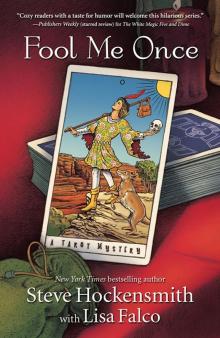 Fool Me Once: A Tarot Mystery
Fool Me Once: A Tarot Mystery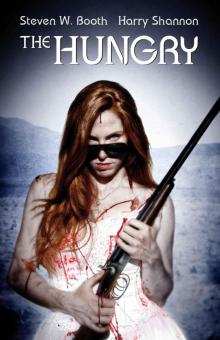 The Hungry
The Hungry Naughty: Nine Tales of Christmas Crime
Naughty: Nine Tales of Christmas Crime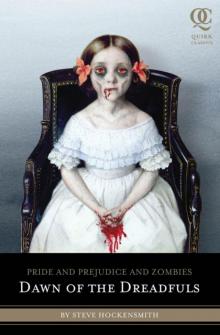 Pride and Prejudice and Zombies: Dawn of the Dreadfuls papaz-1
Pride and Prejudice and Zombies: Dawn of the Dreadfuls papaz-1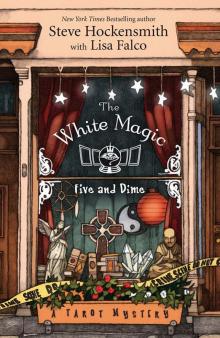 The White Magic Five & Dime (A Tarot Mystery)
The White Magic Five & Dime (A Tarot Mystery)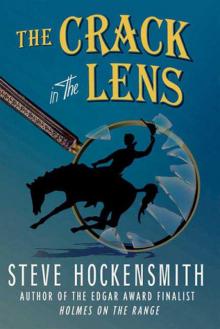 The Crack in the Lens
The Crack in the Lens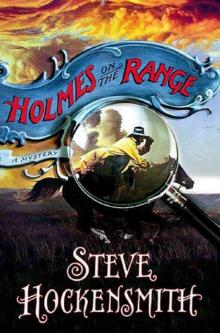 Holmes on the Range
Holmes on the Range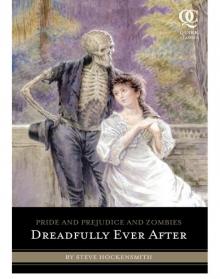 Dreadfully Ever After
Dreadfully Ever After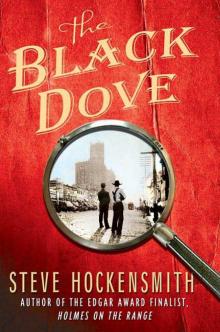 S Hockensmith - H03 - The Black Dove
S Hockensmith - H03 - The Black Dove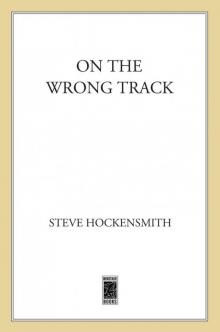 On the Wrong Track
On the Wrong Track Naughty-Nine Tales of Christmas
Naughty-Nine Tales of Christmas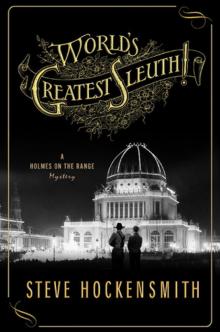 World's Greatest Sleuth!
World's Greatest Sleuth!